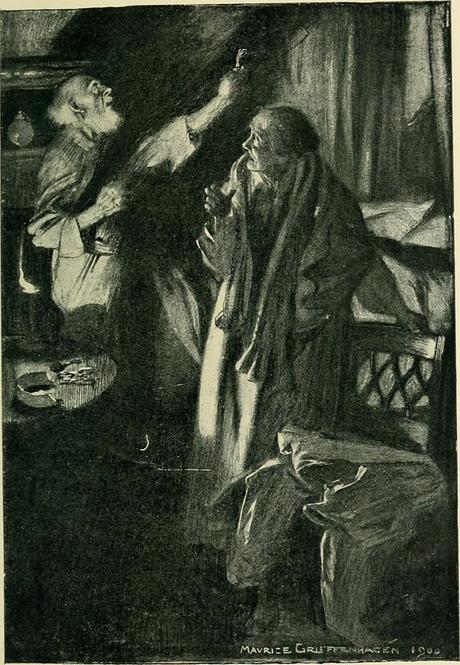Okay, in the spirit of my epiphany that commenting may apply to short stories as well as to collections, I thought I’d muse on W. W. Jacobs’ “The Monkey’s Paw.” Somewhat like Washington Irving, as a writer Jacobs was known primarily for this story. Like “The Legend of Sleepy Hollow,” this tale has taken on a life of its own. I recently read it for the first time, and I wasn’t exactly sure how it would end. I knew the basic premise: somebody ends up with an exotic monkey paw that grants wishes, but the wishes, as is often the case, turn out poorly. There’s a kind of morality to such stories, of course. People shouldn’t rely on wishes for their happiness and any windfall has its consequences. What makes this a horror story isn’t the magic, however. It’s what we expect to see because of it.
 Image credit: Maurice Greiffenhagen illustration from The Lady of the Barge, 1902; public domain via Wikimedia Commons.
Image credit: Maurice Greiffenhagen illustration from The Lady of the Barge, 1902; public domain via Wikimedia Commons.
If you haven’t read the tale yourself, it goes roughly like this: an older couple and their working age son have a guest stop by their hovel of a London home. The guest served in the British Army in India and it was there that he acquired the eponymous paw. He sadly tells his friend that no good can come of it and they should destroy it (they snatch it from the fire when the friend tosses it there). Of course, they don’t really believe it will work. The son suggests they wish for 200 pounds, to pay off their house. He then leaves for work. Later a stranger stops by to tell them that their son has been killed in an accident at the factory. Denying responsibility, they nevertheless offer 200 pounds to help with the hardship. The grief stricken mother then insists they wish their son would come back.
This is prime real estate for horror, of course. The son had been badly mangled in the machinery at the factory. I won’t spoil the third wish, and besides, you’ve probably read it before. The story has been retold countless times, with changed settings but always the same message—be careful what you wish for. Jacobs was able to make a living from his writing. This is increasingly a rarity today, of course. Nevertheless some eight decades after his death, outside the circle of literature scholars, he’s known for one short story. Prior to reading it I couldn’t have even told you who wrote it. This isn’t a bad way to make a mark on the world. Those of us who write often put much of ourselves into our stories, and to have even one of them remembered would be an honor indeed.
